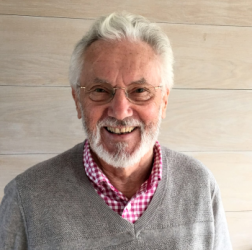Young Physician Award Jean Klastersky
09/12/2019
Professor Jean Klastersky lends his name to an award to encourage research into supportive care

The "Young Physician Award Jean Klastersky" was awarded for the first time on 6 December 2019 at the 9th "Cancer Toxicity Management Conference" held in Paris under the aegis of the MASCC (Multinational Association of Supportive Care in Cancer) and the AFSOS (Association Francophone des Soins Oncologiques de Support). An award to encourage the spirit of innovation and research in supportive care and that bears the name of a pioneer in the field: Professor Jean Klastersky, Head of the Medical Service at the Jules Bordet Institute between 1977 and 2005 and today still an active member of many associations dedicated to medical oncology and supportive care.
Encouraging research into supportive care
On 6 December 2019 the first "Young Physician Award Jean Klastersky" was awarded to a young doctor involved in providing care for cancer patents. This award consists of a financial allocation of € 2,000 and enrolment at the next MASCC Congress. "Medicine and oncology are evolving at a prodigious rate, which is why it is important to continue to pursue research. All new treatment methods recently discovered, such as immunotherapy, imply new toxicities that we must understand and begin to master. Supportive care is a field that will continue to develop and to diversify. This award is therefore an excellent initiative to encourage the spirit of innovation," stresses Professor Klastersky.
A pioneer of supportive care in medical oncology
Professor Jean Klastersky was Head of the Medical Service at the Jules Bordet Institute between 1977 and 2005. He was also a professor at the Université Libre de Bruxelles. In around the year 2000 he became particularly interested in supportive care, that is, in a care continuum designed to improve the quality of life of the patient undergoing cancer treatment. Initially focused principally on physical problems (infections, pain, etc.), the discipline has progressively developed to also include a psychological and social dimension. It was for this purpose that the Supportive Care Unit was created in cooperation with the Psycho-Oncological Clinic at the Jules Bordet Institute. Professor Klastersky, a genuine pioneer in creating and developing supportive care, also helped found the MASCC, of which he was President for 10 years (from 1988 to 1999). Today the MASCC has more than 5,000 members worldwide.
Focusing on tomorrow's major challenges
The major challenges facing supportive care in oncology in the years to come fall into five key areas:
- An ageing population to which supportive care will have to adapt;
- The cost of new medicines and access for all to quality medicines;
- A very rapid development of therapeutic treatment that requires medical training in the very latest medical developments;
- Increasing patient autonomy as the patient becomes a care partner;
- Cancer survivors who form a growing population who also have particular needs in terms of care and psycho-social aspects.